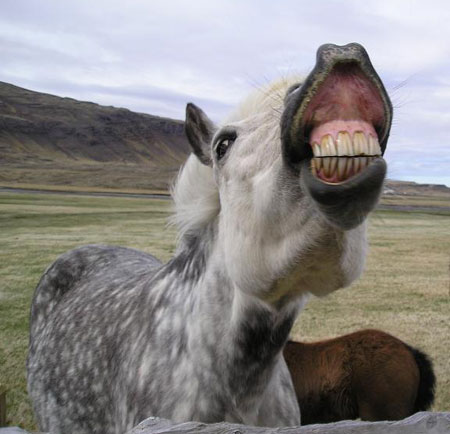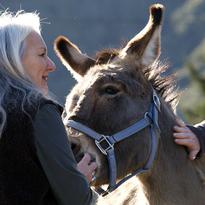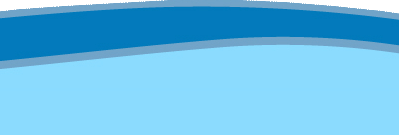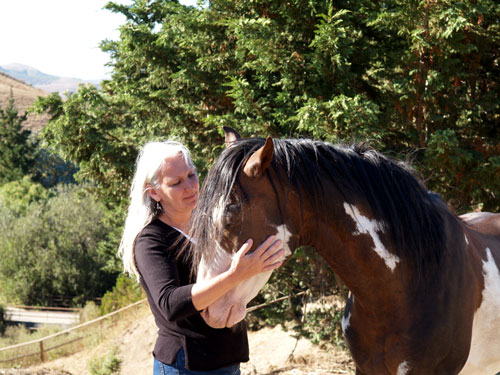Holistic Equine Dentistry
We have found that Communication, Reiki, and therapeutic grade essential oils are a powerful combination for Equine Dentistry. When using these natural, non-invasive forms of communication, healing and support, we have found that frequently there is no need for sedation while performing equine dentistry. If sedation is needed, it is very little.
It is much less stressful for the horse when done in a holistic way, in partnership and with compassion and understanding. Because of what I have learned about equine dentistry and what I have seen in client's horses, , I do not advocate the use of power tools to float the mouth, unless it is a severe case and there isn't any other alternative. I feel most horses can be done by hand floating by a qualified equine dentist to get the best results and with the least trauma to the horse. If power needs to be used, please make sure you have a competent equine dentist.
I have found in many of my clients horses, that frequently power can take an unfortunate toll on the horse. The common use of over-sedation, hanging the horse's head, mowing the molar tables down to where they're too short and smooth, frequently at incorrect angles, and too much heat on the dentum of the teeth causing cracks and fractures is harming our horses. Also the use of opening the speculum too wide to get the power tools in, has caused damage to the TMJ and jaw.
The aftermath of a float with power in the wrong hands can be quite severe. Often times the molars are addressed and the incisors aren't addressed and left too long, this causes extreme pressure on the incisors and can fracture them. It also can create problems because the molars, upper to lower, aren't meeting anymore.
Many trainers don't understand how important the teeth are. I have seen trainers complain about the behavior of the horse, when all that was needed was to have the teeth floated.
For those of you that may have behavior problems with your horses, especially youngsters, have your equine dentist take a look in the mouth for caps and new teeth, it's frequently the root of the problem.
In older horses, an incorrect mouth can cause many behavioral problems, stiffness in the body, not wanting to turn in a certain direction, etc. and getting a balanced mouth can frequently alleviate these issues.
Important facts regarding teeth in young horses and their development.
A horse is born with a total of 12 molars ~ 3 upper molars and 3 lower molars on each side, Total of 12 molars at birth
At 6 - 8 days ~ 4 incisors erupt 2 upper and 2 lower central incisors
6 weeks, 2 more upper and 2 more lower incisors on either side of the central incisors
6 months 4 more come in, 2 upper and 2 lower , corner incisors
6 months the 2 wolf teeth erupt (its possible to have none to 4 wolf teeth in varying positions)
The last Permanent teeth come in at 2 , 3, and 4. The last 12 molars that come in, never have caps, only come in as permanent teeth
At 2 1/2 ~ the youngsters get their first permanent teeth, 4 molars and 4 incisors ( losing their caps.)
The permanent tooth is 3 inches long in total. The whole permanent tooth erupts from upper and lower jaw bone. They are not down completely until 3 years of age. This is a 6 month process to break through gum. Also the four incisors caps come out over the next 6 months until they are in wear.
At 3 years old ~ the next molar caps come off and it's another 6 months until the new teeth are in wear.
At 3 1/2 ~ the 3 molars come in and start to line up. They also lose 4 caps and it is another 6 months until those teeth start to wear.
At 4 1/2 ~ 4 incisors caps come off and permanent teeth erupt.
Then the last three molars in upper and lower come in ,( total of 6) and they are perment teeth, never having caps . This makes the 4 th molar the oldest tooth in the mouth and we look for the wear in older horses.
At 5 yrs ~ all permanent teeth are in and mouth is ready to "go to work" with bit, etc.
So in summary:
At 2 1/2 - 8 permanent teeth are coming in
At 3 yrs - 4 molars coming in
At 3 1/2 - 8 permanent teeth , 4 molars and 4 incisors, are coming in
At 4 yrs - 4 more molars come in
At 4 1/2 - 4 remaining incisors come in
At 5 all teeth in and starting to wear if everything is balanced.
The most crucial time in a horses mouth is when many trainers are starting youngsters from 2 to 4 1/2 yeas old . The bit can be most painful until they are 3, and the whole mouth is in this tooth erupting process until they are 5. The bumps under the jowl are the teeth trying to cut through the gum to come up and knock out the caps.
Equine dentistry is extremely important, especially for the young horse being started with a bit. So make sure you and your trainer are observing your youngster and taking care of their teeth during this time period.
.
For more information about Equine Dentistry, an excellent resource is "Oral Health in Equidae" by Dale Jeffrey ( www.horsedentistry.com )
Disclaimer: These modalities of healing and education are designed to enhance the healing process and not intended to take the place of good medical and veterinary care.





